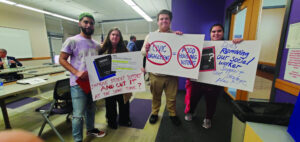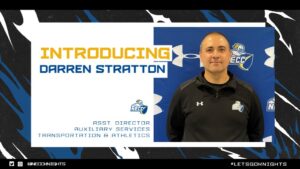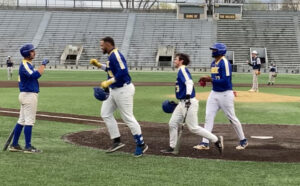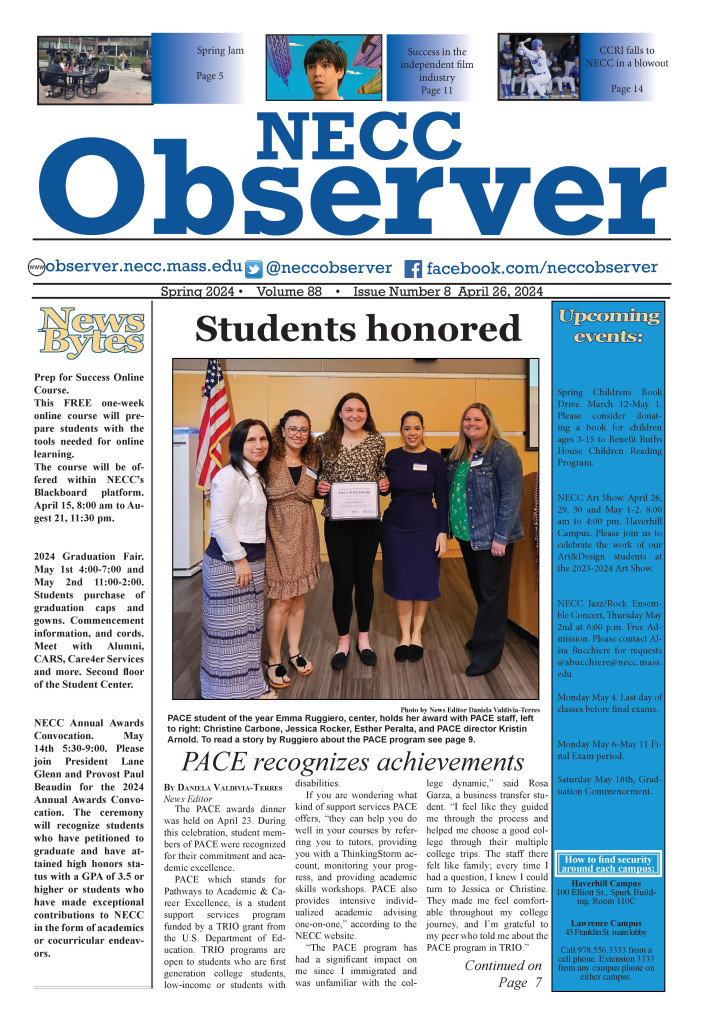
College administrators have proposed eliminating the position of Civic Engagement, Service-Learning, and Community Resources Coordinator.
Since 2015, working on developing plans for increasing student civic engagement, creating alliances with organizations to help students experiencing food, clothing and housing insecurity, advocating for paid-internship student programs, adjunct professor and licensed social worker Janel D’Agata-Lynch has been the civic Engagement, Service-Learning, and Community Resources Coordinator, but her position could be terminated on May 12.
Retrenchment describes a situation in which someone loses their job because their employer does not need them, according to Collins Dictionary. This is D’Agata-Lynch’s current situation. Many students, faculty and staff are concerned with this decision by the administration and are looking for solutions.
According to the agreement between MCCC and the Massachusetts Board of Higher Education, once a position is retrenched, that position cannot be reinstated for the next four years. So, the essential work cannot get done.
Students and faculty called for fairness in the last board of trustees meeting
On April 12, during the last meeting of the board of trustees at El Hefni on the Lawrence campus, staff members, faculty and students were sitting and standing in the room, waiting for Sarah Pachano’s speech at the end of the meeting. One hour later, Pachano, student trustee, Student Government Association SGA president, and recently appointed Civic Newman fellow, spoke out.
“I am here today to express my grave concern about the recent decision taken by the President to retrench the Civic Engagement, Service-Learning, and Community Resources Coordinator position at our community college,” Pachano said.
“Students face numerous challenges, including financial difficulties, food insecurity, and housing insecurity, which can significantly impact their academic performance. I believe these students are best served through the Basic Needs Security Program by a dedicated staff person. Janel D’Agata-Lynch has personified the idea of serving-ness in the work that she has done; on behalf of the students at the college, I call upon the President to reverse his action,” stated Pachano.
“It’s not the same to have a number to contact someone instead of having someone (in-house) who cares for you, to help you, to tell you ‘it’s OK.’ Especially for the Hispanic students because we are taught at very young age that we cannot ask for help. We do need someone there to say, ‘It’s OK to ask for help’ someone who cares for us,” ended Pachano.
Professor of philosophy, Meredith Gunning together with Elijah Antunes, vice-president of SGA, the Student Government Association, among other students were holding signs against the retrenchment of D’Agata-Lynch’s position.
“No Civic Engagement equals No food, no housing, no voting,” was written in red on one sign. Another sign read, “Does removing our social worker support our strategic plan?” next to the photo of the cover of “Success for All – NECC Strategic Plan 2022-2027.”
After loud applause for Pachano from the audience, NECC President Lane Glenn answered: “No services for students will be missing whatsoever… In fact, all services will be extended. You have in front of you a card,” he showed a kind of a business card.
“It’s a Crisis Resource card, for all the emphasis in all the resources. Much like the subtitle of this book,” he showed a book, “is a team sport, the kind of services we provide students that trustee Pachano has being describing has always been a team sport. They never had been the job of one person. It’s always been a number of people would respond to these things and will continue…”
The Crisis Resource card introduced by the NECC president includes a large array of general emergency phone numbers from different organizations. For instance, from Lahey Psychiatric Crisis Team, YWCA Sexual Assault & Domestic Violence, Veterans Crisis Line, among others. It does also include NECC Community Resource contact, which is Janel D’Agata-Lynch’s office phone number.
People from the audience wanted to ask questions but the NECC president deterred them by explaining that any participation from the public requires 24 hours’ notice. He closed the meeting and he and the board members left.
The board of trustees attending in person were Chair Jennifer Borislow, Vice-Chair Marianne Paley Nadel, Jouel Gomez, Glennys Sanchez and Evan Silverio. Other board members attended on zoom. None of the board members responded to Pachano’s speech or the people with signs against the retrenchment that were standing in front of them.
Comments in the hallways by professors and students
“I’m very disappointed as a student, especially from the Lawrence campus, with other students who come from lower income backgrounds like me… By helping students not just with the food pantry but helping them sign up to vote, helping them with housing, her (D’Agata-Lynch) work has gone above and beyond. The fact that her position is being retrenched with little to no explanation. Students are questioning. As the student (SGA) vice-president, it’s my responsibility to tell them this is unfair,” Elijah Antunes said.
“Janel has helped over 22,000 students. What’s going to make more of an impact? A card that no one has ever heard about or a licensed social worker who actually can provide the resources or know where to go. Which number will they call? Well, I’m sure the president might say ‘I don’t know, figure it out, there’s the card.’ It’s not OK that their plan is absent for such an important role,” Antunes said.
Pachano said about the NECC president’s reply: “He decided to ignore the students’ request. He is gaslighting the students into believing that we are going to keep the same resources, the same type of care that Janel (D’Agata-Lynch) offers but what they are doing is reorganizing what she does, and putting a lot of jobs to more people who does not need to do that and that’s going to be detrimental to students.”
Faculty answered questions from an Observer editor on the spot, showing their support to their colleague D’Agata-Lynch and their disapproval of the proposed retrenchment.
“The position of the individual who has direct contact with students who actually meets with them, sits down and understands what their issues are. It’s not just getting students to go to one place or another, it’s truly understanding what is happening and being able to not just connect but provide the answers that they need. That position is extremely important so we could have partners around the community that help students, but that individual is the lifeline of everything. Our students need that point of contact. So that is the position. It’s an incredible position for students,” said marketing and entrepreneurship professor and Chair of the Business Department, Sheila Muller.
“When you think of all the pantries, all the other things that are around the campus, it was created because individuals listened to the students’ needs. Positions were available, positions were made, created and resources were created as a result. It’s a collaboration across the campus, between the SGA and the community services. All these individuals came together to provide us with what we have right now and advocated for more resources. So, now saying ‘thank you very much but we no longer need this position’ is a big hard pill to swallow for a lot of people. So, retrenching the position is actually a bigger problem for a lot of us than saying that these resources are going to be elsewhere,” stated Muller.
Faculty are looking for answers and want an action plan on behalf of students.
“I wish there would be more transparency. If they are claiming they are expanding services, I would like to hear more of a concrete plan because I’m hearing fake things about an expansion but not who is going to take the place or doing this work. I used to be a faculty member for the outreach group, I could say as a faculty member here for a long time, just to send students to Janel (D’Agata-Lynch) directly made a big difference instead of saying ‘call this numbers on this hot line.’ Students may be scared and may not call whereas if they meet one on one with a social worker, I think that makes a difference. Janel is a trained social worker and I think trying to deviate these tasks to already frequently overworked staff and faculty, I don’t think is a wise idea… What is the possible plan or helping students to receive those services?” said professor of Philosophy and Chair of Global Studies Department, Meredith Gunning.
Vice-President outlined an explanation
Noemi Custodia-Lora, vice-president of Lawrence campus and community relations, aid about Pachano’s speech that “it’s so important that students get actively involved in social justice issues and create awareness of the needs of students.”
Questioned about the possible retrenchment, Custodia-Lora said while she could not comment on the details of the retrenchment of the position, she could mention what they were intending to provide in the future.
“We are not retrenching services. This is something that I want to make clear to everybody. When we created the Center for Equity and Social Justice back in 2019, part of the job of that is to figure out how we can collaborate with community partners to better serve our students, because with the limited budget that we have, with the expertise what we have, we may provide a limited amount of services to students,” Custodia-Lora said.
Custodia-Lora said they are working with a couple of large nonprofit organizations that are experts in providing support services to students, and students would have an external relationship with them. Students may be able to receive assistance and use resources after they leave NECC, she said.
“We’re excited about the new projects that would be coming out of this, and some of that will include having more targeted services to students. Especially those that do not have transportation and we might have to deliver meals at home for example, which is something that is not happening in life right now,” she said.
When questioned if instead of having one contact person in-house, D’Agata-Lynch, who is the Civic Engagement, Service-Learning, and Community Resources Coordinator, they would outsource those services, Custodia-Lora answered:
“It’s not about hiring an organization because it would defeat the purpose of restructuring. It’s partnering with organizations that are already doing the work of food insecurity and working on providing some of the social services to students.
“We will still continue to expand and figure out better ways for students to do Service Learning and that would be through Academic Affairs.
“We developed the Justice, Equity, Diversity and Inclusion (JEDI), we hired a person (Francellis Quinones) who will take the lead on Civic Engagement projects and figuring out what we are or not doing, and how we can expand.
“There’s also opportunities for people to apply for other positions,” she said.
Custodia-Lora said that a better way for students to access resources would be through one phone number or one way to contact a variety of people who know what resources are accessible 24/7.
She also emphasized the importance of building trust and being culturally sensitive. Custodia-Lora stated that more than 50% of students at NECC are English language learners. For this reason, they considered bringing a Spanish-speaking person for the JEDI position, she said.
“Even myself sometimes I feel much better, when I’m talking to a doctor or in a crisis, to speak to somebody in Spanish, so we also bring on that to the table that they (Spanish-speaking students) can call anybody at any given time,” she said.
Custodia-Lora added: “I want us to, for example, when we offer food to students, we could give them beans, rice, tomatoes… you know, things that are even also more culturally sensitive to us, even with the frozen food.”
Custodia-Lora said: “This is a new plan that we have, and I really hope that more students get involved in this because to me that’s important.
“We need to remove ourselves from the position and we really need to tackle the larger issues which is, are we serving the students the best way that we could?” she said.
But why does this matter to the students?
Regardless of background or ethnicity, D’Agata-Lynch, as the Civic Engagement, Service-Learning, and Community Resources Coordinator, has served students with the following programs in both campus, Lawrence and Haverhill:
Civic engagement. Helping students to register to vote and organizing events to engage students with their right to vote.
Thanks to her campaigns, NECC was recognized with a Silver Seal for Voter Excellence for the college’s 2018 voting rates by this organization, and in 2022, NECC was recognized as one of the Most Engaged Campuses for College Student Voting.
Civic Engagement paid-internship course COP. Thanks to a grant D’Agata-Lynch wrote, she got the funds for this course. Students get paid $20 per hour up to $3,000 for the semester to engage in a civic engagement/leadership internship working for a nonprofit or a government organization. Once per week, intern students have class with professor D’Agata-Lynch where they learn about important subjects related to the workforce as equity, equality and inclusion. This reporter is currently a student in this course.
Clothing assistance. Students get a free voucher to shop in a local secondhand store.
Free monthly Mobile Market. Students, faculty and staff shop for free produce and/or any food available.
Food pantry. At any time, students can shop for free food like pasta, cereal, etc. Even hygiene products like shampoo or soap.
According to the Eagle Tribune, in June 2021, Senator Elizabeth Warren visited Lawrence NECC campus to tout the Student Food Security Act, legislation aimed at addressing food insecurity on college campuses. NECC President Lane Glenn, former interim Lawrence Mayor Kendrys Vasquez, D’Agata-Lynch, and students escorted the senator to show her the food pantry, and she praised NECC for their initiative.
Feminine product baskets. In any women’s bathroom, students can take free tampons or pads.
Frozen food. Students can take unlimited free frozen ready-to-eat food.
Housing insecurity. According to students’ needs, whether they have children or not, they would be accommodated by nonprofit organization, and followed-up by D’Agata-Lynch.
Numbers talk
Let’s see in numbers the impact the most popular program, the Mobile Market, which celebrated April 25, its sixth anniversary of helping students and NECC families. They have helped: 26,253 individuals; 7,233 households; and distributed 223,568 lbs. of food, according to a flier from the program.
During the 2022 calendar year alone the market served 433 households representing 1,593 persons. In addition, 320 students were provided with Smart Meals, gift cards, feminine hygiene products, food pantry items, and/or food vouchers
Who is Janel D’Agata-Lynch and why does her position matter?
She holds a Bachelor of Arts in Sociology from College of the Holy Cross and a master of social work with a concentration in community organizing, policy, planning, and administration from Boston College. Since 2004, she has been a licensed social worker. In 2015, D’Agata-Lynch was hired as civic engagement and service-learning coordinator. Since 2017, she also has been the community resources coordinator.
Fully committed to serving students and community, she had developed all programs mentioned before. Also, as an adjunct professor, she has taught sociology and civic engagement courses.
In 2019, D’Agata-Lynch received the NECC Employee Recognition Award as she encouraged students to engage civically through volunteerism. “In addition, she has been a champion for students who experience food insecurity and housing instability…She accomplishes all with a calm, personable, compassionate and down-to-earth demeanor,” said Paula Richards, associate professor of Academic ESL and English, who nominated her.
In a Letter to The Observer’s Editor, professor of Art & Design Michelle Carter, said “when a person is without basic needs, it can feel overwhelming to try to navigate various channels of aid. Janel helps connect students to these resources, coaching them to self-advocate. She also runs food pantries on both campuses and a free monthly farmers’ market, among other initiatives. It makes such a difference to me, as it does to many faculty, to know that I can refer students to an in-house social worker if needed.”
D’Agata-Lynch is involved actively in “the union.” She is a director of the Northern Essex Community College Professional Association (NECCPA) which is one of the local chapters of the Massachusetts Community College Council (MCCC), mostly known as “the union.”
As professor Gunning stated “this (D’Agata-Lynch’s retrenchment) is an attack on a MCCC position. Every time that any union position is eliminated, the union is weakened and our ability to bargain collectively for our shared well-being is undermined.”
D’Agata-Lynch declined an interview with The Observer as the union was negotiating her current situation.
What matters to the administration
Last month, in an interview on Judy Josephs’ show called “History of Success” broadcasted by Lynn Community Television, NECC Provost Paul Beaudin said “I have found at Northern Essex, a community of professionals who believe as I do that what students think matters, the student experience in the classroom matters, the modalities of the classes that we offer matters.
There are so many things that matter, and we need to make sure that we are being effective in promoting a history of success.”
Beaudin told this reporter he could not answer or make any comments about D’Agata-Lynch or the student programs she oversaw.
This reporter also attempted to interview NECC President Lane Glenn but the Chief of Staff, Cheryl A. Goodwin, stated Glenn could not comment because of ongoing negotiations with the union about the position.
When asked about the plan for all the student services D’Agata-Lynch position was covering, Goodwin said none of these programs would disappear, instead they would be more robust. “How?” I replied. Goodwin said she couldn’t give me more information.





